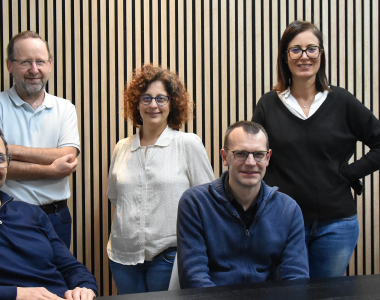News
ALPhANOV selected as a research partner in two new assessments of the LASHARE project
LASHARE is a European project involving more than 40 partners from across Europe, SMEs and the most renowned European laser research institutes. Following a competitive call launched in February, LASHARE granted 14 new LEAs (Laser-based Equipment Assessments) during its latest general meeting. ALPhANOV was selected as a research partner in two of these new LEAs.
The main objective of LASHARE is to share knowledge on laser-based equipment and its use addressing the whole value chain end to end. As a key success factor for European manufacturing, the transfer of innovative solutions from the laboratory into industrially robust products and the dissemination of its use stands at the heart of the project. The LASHARE project is structured in several LEAs (Laser-based Equipment Assessments). All of them involve a supplier, an industrial user and a Research partner to take a demonstrated piece of equipment to a new level of technology readiness.
During the first phase of LASHARE (September 2013 – September 2015), ALPhANOV was involved in two LEAs: TEETO with Teem Photonics and Micel and FEMPAR with Amplitude Systèmes and Monnaie de Paris. It is now involved in two of the 14new LEAs, LASAO and SCALP, determined through a competitive call launched last February.
The LASAO LEA aims to validate a closed loop control wavefront correction system for the optimization and long-term stabilisation of femtosecond laser beam parameters for the engraving of innovative calibration standards for monitoring fluorescence imaging systems. It gathers ALPhANOV and two SMEs, Imagine Optic and Argolight. Adaptive optics components supplied by Imagine Optic will be used to not only achieve the best possible beam profile by correcting aberrations present in the optical path but also ensure long-term stability for advanced laser micromachining applications such as this one. The combination of a compact wavefront sensor and a highly precise electromagnetic deformable mirror renders possible closed-loop wavefront correction to maintain ultimate beam quality throughout the laser process. The process used by Argolight relies on a very precise laser engraving process allowing to produce patterns in the volume of a special glass with unique fluorescence properties. This process requires very high precision, using a femtosecond laser beam tightly focused inside the transparent material, as well as perfect stability of the laser beam profile during the several hours over which the whole process stretches.
The SCALP LEA aims to validate a 3D scanner used for automated steel sheet laser cutting in the production of vehicles for disabled drivers. It gathers ALPhANOV and two SMEs, ACA and Faro Europe. ACA is the leader in Europe of adaptation and automotive amenities for disabled people. It produces more than 3000 vehicles a year, as unique solutions tailored to individual needs. The vehicles are equipped in their workshops and through a national network of installers. However, the fabrication process has remained vastly “home-made”, heavily relying on mechanical cutting of the car body operated by technicians. As the demand for vehicles for disabled drivers increased, ACA decided to engage in a large-scale industrialisation process to significantly increase its production capacity. The SCALP LEA will establish a preliminary step in this large-scale industrial project. It aims at evaluating the laser processing and metrology solutions envisaged to be integrated in ACA’s industrial process. This validation will strongly focus on automation. For this purpose, the LEA will evaluate a 3D scanner from FARO that will be used to acquire the 3D shape of the car floor to be cut by the laser. A fibre laser will be integrated onto a robot in order to perform automated laser cutting on the car body.


